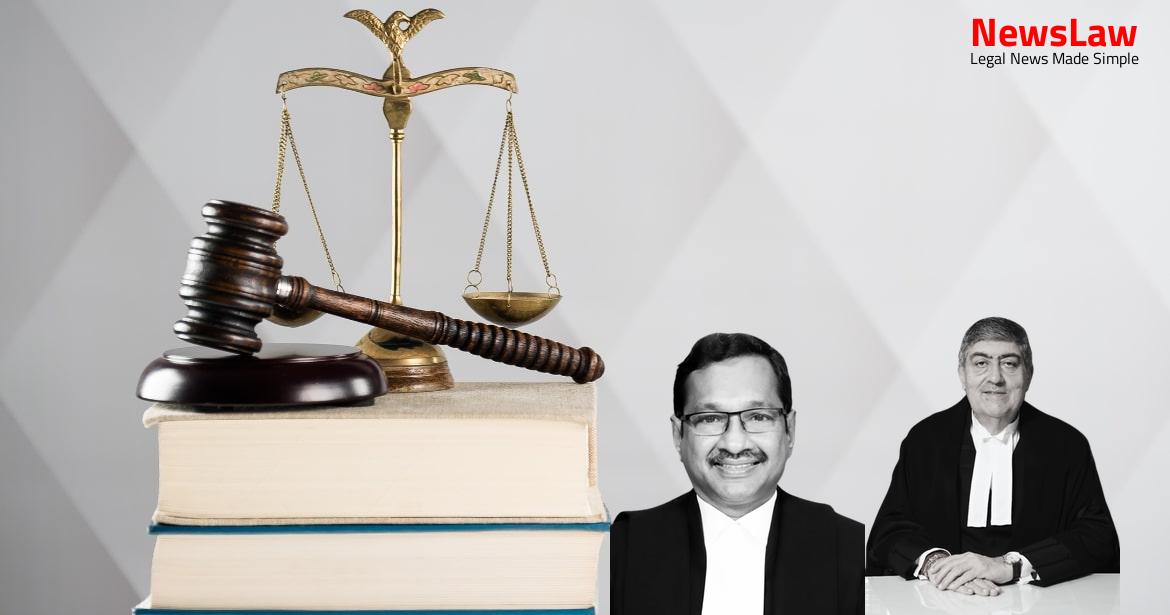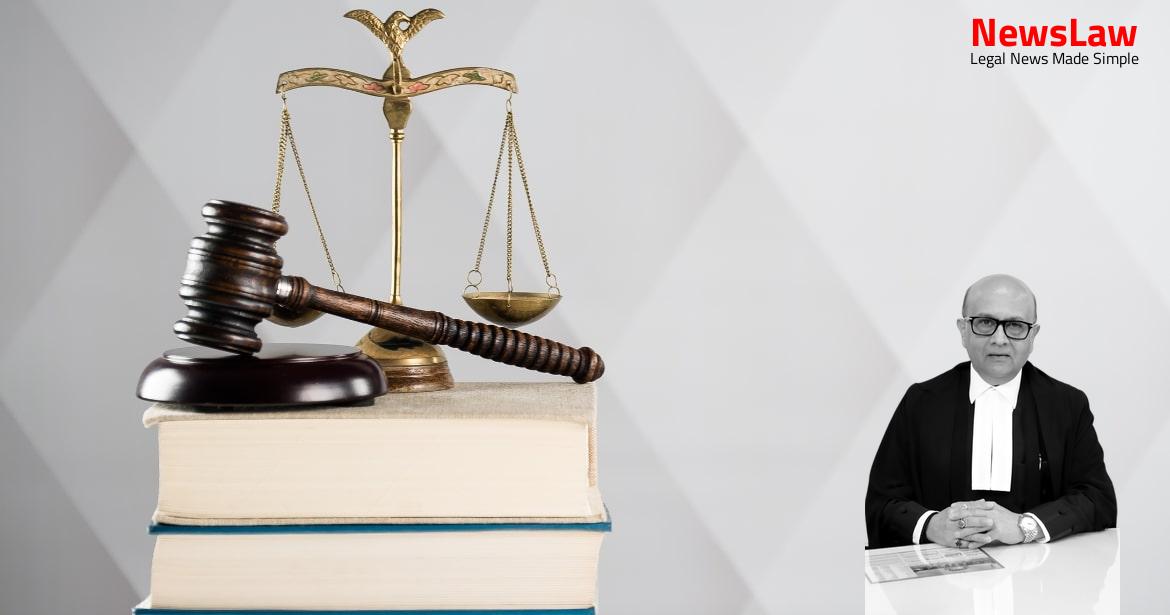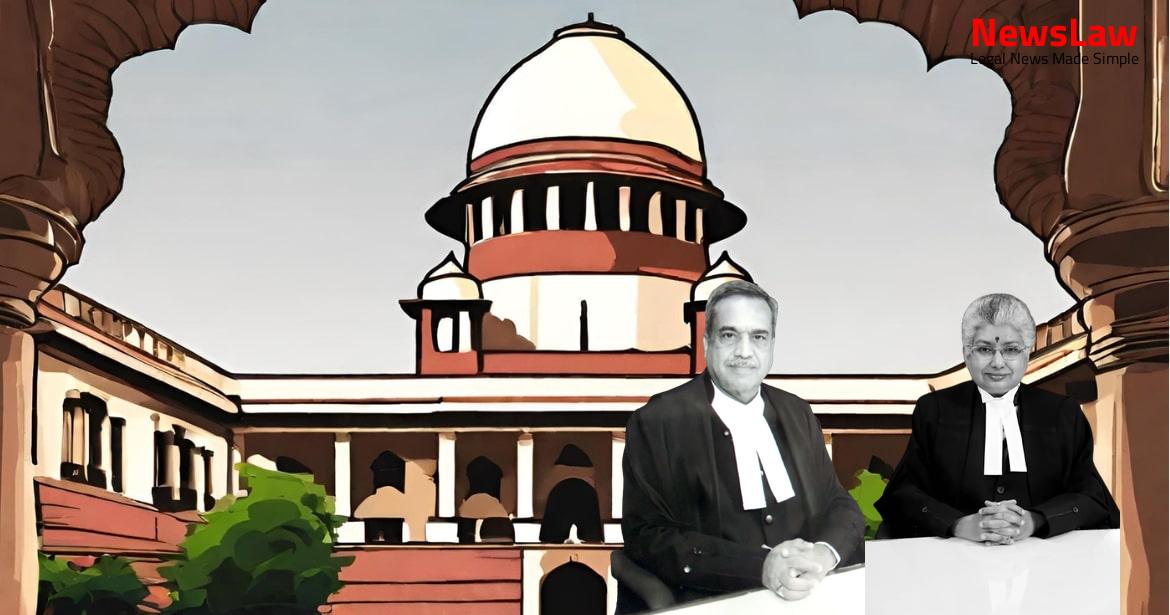Explore the nuanced legal analysis surrounding the exercise of revisional powers in eviction proceedings. The focus is on ensuring that courts adhere to the legal boundaries while maintaining the delicate balance between a landlord’s genuine need and a tenant’s rights. This blog post delves into the complexities of court jurisdiction and the interplay of legal principles in such cases.
Arguments
- The appellant challenged the decision of the High Court of Delhi in exercising revisional power under proviso to Section 25B(8) of the Act.
- The appellant’s counsel argued that the High Court’s decision without specific findings on the Rent Controller’s reasoning exceeded the jurisdiction granted.
- The respondent filed an application seeking leave to defend with three primary contentions: questioning the appellant’s title, claiming the property belongs to the Government under the Enemy Property Act, and asserting the availability of alternative accommodations.
- The Rent Controller dismissed the application stating the title of the appellant cannot be challenged, the allegations on alternative accommodations were vague, and the Enemy Property Act did not apply to the properties in question.
- The appellant denied ownership of the alternative properties mentioned by the respondent and disputed the validity of subsequent proceedings under the Amended Act.
- The appellant, now claiming through inheritance and an award, filed the eviction petition in 2014 based on Section 14(1)(e) and Section 25B of the Act, highlighting the bona fide need for eviction as discussed by the Rent Controller.
- The respondent sought the dismissal of the present appeal.
- The respondent’s application to implead himself was rejected for lack of bona fides.
- Proceedings challenging subsequent notices are pending in the High Court of Delhi with an order of ‘no coercive steps should be taken’ passed.
- The authority under the Amended Act has recognized the respondent as its tenant.
- Subsequent events must be taken into account while confirming the High Court’s order.
- Appellant has alternative accommodations available for business operations.
- The respondent submitted that there are triable issues supporting the High Court’s revision allowance.
- The award obtained on 11.03.1980 is under a cloud and should be disregarded.
- Title of the appellant’s property has a serious cloud due to some owners living in Pakistan.
- The respondent referenced specific judgments to support their case including M.M. Quasim v. Manohar Lal Sharma and Ors., P.V. Papanna v. K. Padmanabhaiah, and others.
Also Read: Supreme Court Judgment on Single Till Mechanism for HRAB Calculation: A Comprehensive Analysis
Analysis
- Section 14(1)(e) of the Delhi Rent Control Act, 1958 carves out an exception to regular eviction procedures.
- The High Court has supervisory power under the proviso to Section 14(1)(e) to ensure that the Rent Controller’s order conforms to the law.
- The controller can make an order for recovery of possession of premises only on specific grounds, including the landlord’s bona fide requirement for residential purposes.
- If the landlord has another reasonably suitable residential accommodation, they cannot evict the tenant on the ground of bona fide requirement.
- Section 25B provides a special procedure for the disposal of eviction applications based on bona fide requirements.
- No appeal or second appeal is allowed against the Controller’s order for recovery of possession in such cases.
- Section 19 restricts the landlord from re-letting the premises obtained through eviction without permission for three years, and the Controller may direct putting the evicted tenant back in possession.
- The tenant cannot dictate to the landlord how to utilize their property for business.
- A mere assertion is not enough to rebut the presumption in favor of the landlord’s bona fide need.
- The Rent Controller’s satisfaction in granting leave to defend is subjective.
- Prima facie material supported by adequate averments is needed to trigger the presumption in the landlord’s favor.
- Section 19 provides rights to a dispossessed tenant for repossession in case of landlord non-compliance post-eviction.
- High Court should not substitute its views for those of the trial court unless there is an apparent error.
- Leave to defend cannot be granted solely on asking; it requires a triable issue to be raised.
- Section 25-B places a light burden on the tenant to disentitle the landlord from obtaining an eviction order.
- The Rent Controller must ascertain whether the order passes according to the law.
- The High Court’s scope in revisional powers is limited, focusing on legal correctness and procedural compliance.
- Presumption of landlord’s genuine need in eviction proceedings under Section 13-B.
- The High Court must scrutinize if the Rent Controller’s order under Section 25-B is legal and proper.
- Refusal of leave to defend should not lead to summary eviction unless the landlord’s claim is clearly untenable.
- Revisional power is supervisory, ensuring subordinate courts act within legal bounds.
- A strong and acceptable evidence must show tenant’s claims in defense are unreasonable or frivolous.
- The ground for recovery of possession under Section 14(1)(e) requires a genuine need from the landlord.
- The burden lies on the tenant to prove the landlord’s need is not genuine.
- Parties rely on affidavits at the stage of granting leave to defend.
- The burden of proof shifts to the tenant to rebut the presumption of the landlord’s genuine requirement.
- Recent decisions interpret the burden on the tenant to rebut at the stage of leave to defend.
- The section is controlled by the requirement that the High Court must satisfy itself that the decision is ‘according to law’
- The judge must put themselves in the landlord’s position to determine the naturalness, sincerity, and honesty of the need to occupy the premises
- If leave to defend is not granted or refused, an eviction order follows
- Section 25-B mentions ‘special procedure for the disposal of applications for eviction on the ground of bona fide requirement’
- The standard for granting leave to defend should be based on raising triable issues and the need for proper adjudication on disputed facts
- The distinction between desire and need should be kept in mind while considering the landlord’s requirement for possession
- It is essential for the landlord to prove a genuine need rather than a mere desire for possession
- The balance between landlord’s requirement and tenant’s rights needs to be maintained
- Revisional powers are to ensure the regularity, legality, or propriety of proceedings or decisions of the subordinate court
- The High Court’s interference with findings of fact should be based on satisfying itself of the correctness or legality rather than personal disagreement
- The Assistant Custodian of Enemy Property had earlier observed that the predecessors of the appellant are non-evacuees and their properties cannot be termed as enemy property.
- Another action has been initiated, but no view is expressed on it.
- The High Court rejected the respondent’s impleadment, which was confirmed by the dismissal of the intra-court appeal.
- The rejection of the special leave petition by the Supreme Court was also upheld.
Decision
- Proceedings initiated under the Enemy Property Act are stayed by the High Court based on a report dated 04.11.2015.
- The High Court’s order is set aside, and the order passed by the Rent Controller is restored.
- The appeal is allowed, and no costs are imposed.
Also Read: Selection and Appointment of Judicial Officers in Himachal Pradesh
Case Title: ABID-UL-ISLAM Vs. INDER SAIN DUA (2022 INSC 402)
Case Number: C.A. No.-009444-009444 / 2016



